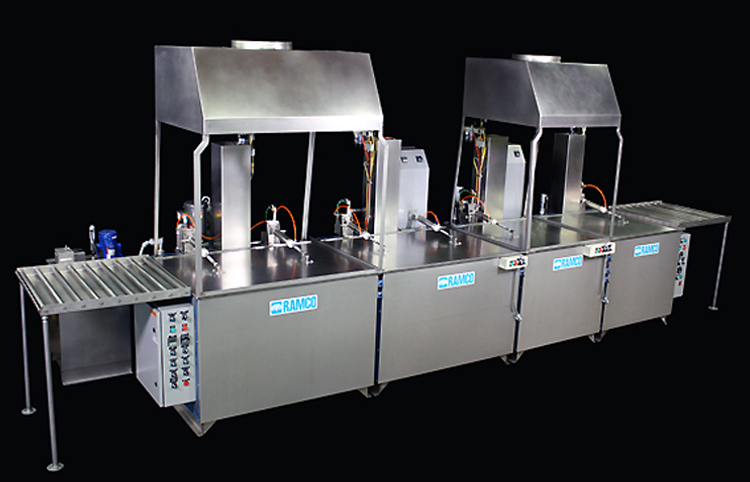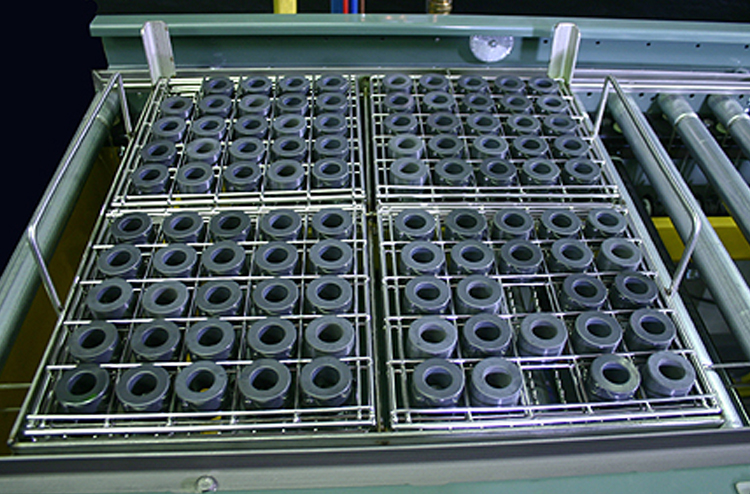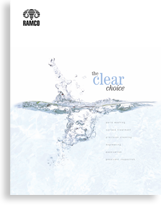Given the ever- changing landscape of virtually all manufacturing, recent technological advances in parts and the exacting demands of penetrant inspection make it advantageous for many companies to take control of FPI immersion parts washers. Farming out such work, as many discover, is not always free of quality control issues.
It’s the right time to take control of quality control with the benefits of bringing any of RAMCO’s custom-built FPI immersion parts washers in house. The numerous modular options for FPI immersion parts washers offered by RAMCO ensure that our partners have a custom engineered system compatible with their materials.

Prior to fabricating a system, Ramco’s team conducts an extensive analysis to confirm the precise approach to our clients’ penetrant inspection jobs. Everything is taken into account:
- Size and location of available space.
- System configuration options given available space.
- The properties of the metals to be processed.
- Parts attributes – their weights, sizes, shapes, etc.
Once this process is complete, Ramco’s FPI immersions parts washers may have any number of features:
- Transport elevators in all stages to accommodate the parts/basket.
- Roller conveyors to facilitate transfer without having to lift parts/basket.
- Prewash and post wash/rinse/dry systems.
- Manual and automatic spray rinse systems.
- Effective hot air dryers for low temperature drying.
- Dry developer stage with pressured air burst and sequenced dust collector.
- Fully automated systems.
The Value of Fluorescent Penetrant Inspection
The detection of flaws in metals and other materials using liquid penetrant inspection dates back to the early 1900s. The process was developed in order to reveal flaws (such as cracks or leaks) in the material being inspected. The introduction of colored, fluorescent and other high-visibility dyes came about in the 1940s. From the beginning, penetrant inspection proved invaluable as a method of testing/revealing flaws and imperfections of non-porous metals without damaging the source material in any way.
In essence, a fluorescent dye is introduced to the part or parts. The dye penetrates covers the surface area and is allowed to dry. Ultraviolet light then introduced, causing the dye to fluoresce, revealing imperfections, including those that may otherwise have been invisible to the naked eye in natural light.
Taking Control of Quality Control
Adding an FPI system for their in-house operations gives your company complete control over every phase of the process, especially quality control of the final product.

Control over penetrant quality – The penetrant’s ability to fluoresce is key. The efficacy of the fluorescent reaction under ultraviolet radiation is contingent upon the radiation absorption rate – a direct factor of the penetrant’s properties: its thickness and concentration.
Control over the washing phase – Temperature, pressure and time are the three essential elements to control during this phase. Wash temperature impacts the water’s surface tension, the amount of wetting action, and the effectiveness of emulsifiers and detergents. Likewise, the pressure with which the wash spray is applied, as well as the coarseness of the spray is a determining factor in assuring that the spray reach all flaws without weakening/diluting their indications. Finally, wash times, agitation times and drying times are important for getting the best results.
Control over the dwell – The “dwell’ refers to the phase during which the component is permitted to sit while the penetrant fills areas being tested for defects. It is common to have two periods: the immersion dwell and the draining dwell. It is essential in both to reach minimum dwell time.
Control over post-penetrant emulsifiers – the thorough breakdown and removal of penetrants from the surface of materials is a crucial part of the entire process. In general, the two common types of emulsifiers are hydrophilic and lipophilic. Hydrophilic emulsifiers are concentrated, water-based detergents containing solvents and surfactants that are added to a water wash to eliminate certain penetrants, requiring dilution before usage. Lipophilic emulsifiers are oil-based substances; their chemical action combined with mechanical agitation will effectively remove penetrants. Here again, having control over the timing of post-penetrant washing is crucial.
Control over the drying phase – The goal here is twofold; first, control the drying process such that it keeps the time required to thoroughly dry the parts is kept to a minimum. Secondly, subjecting parts to excessively high temperature can cause problems with drying. Regulating drying temperature is crucial.
Control over the developer – the role of developer in the penetrant inspection process is to produce from the discontinuity of coverage visible indications of the flaws and imperfections. It has to surpass the dye’s inherent “threshold of fluorescence” or the flaw will not fluoresce brightly enough to be distinguished from the thin film of dye that covers the part’s entire surface.
Control over lighting – Once the part or parts are ready to inspect, they are normally conveyed to an inspection booth and subjected to a flood of ultraviolet light, usually a mercury arc lamp with filter. Here the concentration of UV is of paramount importance because UV rays with a wavelength of 365nm will “excite” the penetrant dyes, causing them to produce a greenish-yellow glowing visible light in the range of 520 to 580nm. The UV light’s filter will sift out other wavelengths that can hinder contrast, as well as filtering out harmful wavelengths.
Having this measure of control over the FPI from start to finish greatly reduces errors and the potential risks which, in turn, has a positive impact on overall quality control.
Take control and explore that options available to you by discussing RAMCO’s line of FPI immersion parts washers with an expert. Contact the RAMCO factory at 800-553-3650.


